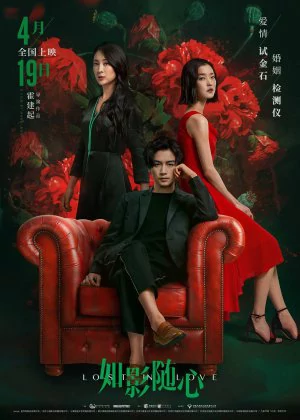Lost in Love

Jianqi Huo is not a household name in the West, even though he's had some mild international success in the past. Chinese romance simply doesn't travel that well, it just doesn't seem to appeal to core arthouse or core genre audiences over here. It's their loss I guess, throughout the years Huo has built up an impressive oeuvre that shows a different, but no less relevant side of Chinese culture. Lost in Love [Ru Ying Sui Xin] is Huo's latest film, where he explores a classic romantic story in a more contemporary setting. It's a little different from what he usually does, but the typical Huo quality is definitely there.
![screen capture of Lost in Love [Ru Ying Sui Xin]](/thumbs/img/articles/1200xauto/lost-love-1.webp)
Jianqi Huo started out in the 90s, a pivotal period for Chinese cinema. Influences of the Fifth Generation in Huo's oeuvre have been undeniable, that said he doesn't fully fit in with the Fifth Generation in-crowd. His films are a bit too uplifting and overall positive for that. Huo has always shown more interest in beauty, the small things in life that make people's lives worthwhile, leaving most the complaining and whining to his peers. On the other hand his rural, often non-contemporary settings have kept him a far relative of the modern wave of Chinese blockbusters and genre films that have boomed since the early 00s.
It's quite a big surprise then to see Huo tackle a very urban, contemporary love story for his latest film. In a sense Lost in Love feels more like an early Yibai Zhang film, dealing with younger people in urban environments, putting a strong focus on their personal relationship problems rather than contextual factors influencing their relationship. Lost in Love is a film about trust and how it evolves when both partners meet each other while being in separate relationships, making this a way more intimate story compared to many other Chinese films.
Lu Song (a violinist) and Wen Ying (a decorator) meet each other on the streets of Paris while hunting for records. They're both after the same LP and after a short struggle, Song caves and gives the album to Ying. It's the start of a passionate romance, even though the both of them are already locked in a relationship. After a short while they decide that their love in worth pursuing, and they break up with their respective partners. But then the passion slowly dies down and when they are faced to rely on each other to keep their love going, doubt starts to seep into their relationship.
![screen capture of Lost in Love [Ru Ying Sui Xin]](/thumbs/img/articles/1200xauto/lost-love-2.webp)
The switch from rural to urban isn't just a change in setting, it's also reflected quite heavily in the cinematography, which feels a lot slicker, featuring more modern touches. The camera work is stark and precise, the colors pop (the reds in particular are striking) and the overall look is a lot cleaner. To top it all off, the film features several memorable shots that will be etched on my retinas for some time to come. This is definitely a look that is closer to my personal preference, though I'm sure not longtime Huo fans will appreciate the shift. For me though, Lost in Love is easily the best-looking Jianqi Huo film to date.
While the cinematography is really classy, the soundtrack felt just a little overdone. Because Song is a violinist the choice for a more classical soundtrack is understandable, but for a romantic drama I prefer a slightly more subdued choice of music. There's a bit too much bombast and sentiment for me to feel truly comfortable with the score. Luckily the core scenes don't seem to suffer too much, as the crescendos are kept for connecting scenes rather than the emotional highlights. Still, it's a little disappointing as the scores in Huo's previous films have always been up to par.
Because this is a more intimate and personal film, a lot of weight rests on the principal actors. It's a good thing then that both Xiao Chen and Juan Du are up to the task. They deliver splendid performances, as they each deal with their personal, as well as their partner's trust issues in a very convincing way. While they portray people with obvious personal defects, it's hard not to feel for the both of them equally. The secondary cast is solid too, though their performances matter less in the overall picture. This film is all about the central performances, and Chen and Du deliver in spades.
![screen capture of Lost in Love [Ru Ying Sui Xin]](/thumbs/img/articles/1200xauto/lost-love-3.webp)
Huo introduces the central issue with great care. The first part of the film is primarily focused on the passionate start of the relationship between Song and Ying, which makes it easier to identify with the characters. It isn't until the passion starts to wind down that Huo introduces their cheating pasts and the trust issues that stem from that. From this point on, the drama takes a more central position in the film and the characters are slowly allowed to flourish. It's a solid structure that builds up to an effective, though possibly polarizing finale.
While his previous work was often characterized by a more classic, romantic vibe, Huo's move to make a more contemporary romantic drama is a very successful one. Lost in Love is gentle and warm. A stunningly beautiful and impressively acted romantic drama, dealing with a very intimate and fragile theme that Huo meticulously dissects. Chances are slim that it will find a substantial audience outside of China, but if you like the genre and the opportunity presents itself to watch this one, better grab that chance with both hands as this film has plenty to offer.